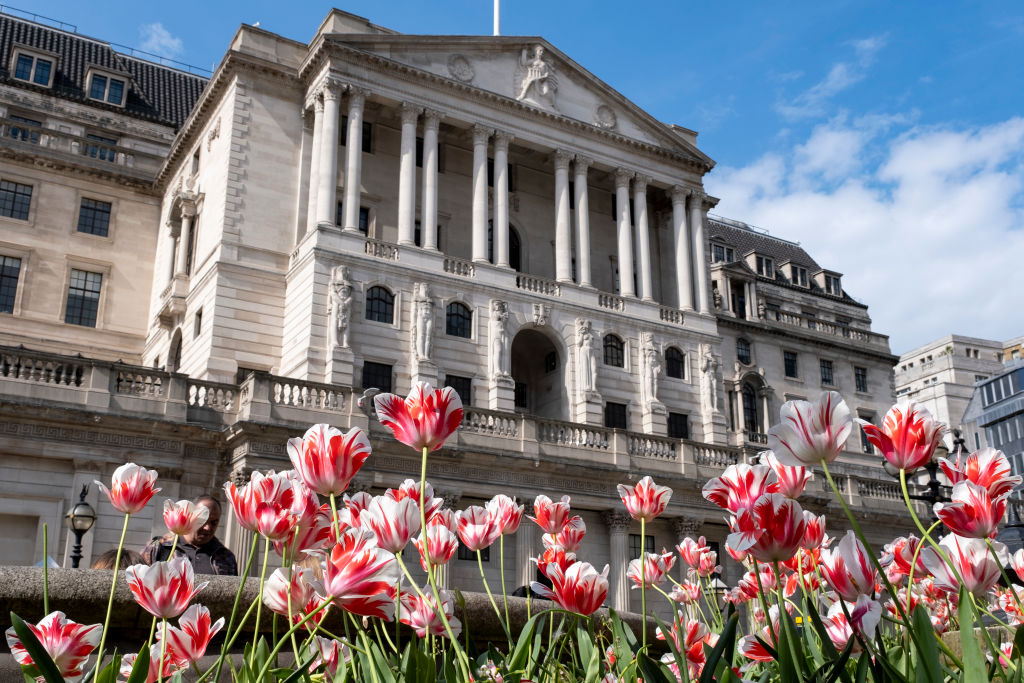Inflation drops below Bank of England target for first time in over three years
UK inflation slowed to 1.7% in September, boosting the chance of a more aggressive approach to interest rate cuts from the Bank of England


Get the latest financial news, insights and expert analysis from our award-winning MoneyWeek team, to help you understand what really matters when it comes to your finances.
You are now subscribed
Your newsletter sign-up was successful
Want to add more newsletters?

Twice daily
MoneyWeek
Get the latest financial news, insights and expert analysis from our award-winning MoneyWeek team, to help you understand what really matters when it comes to your finances.

Four times a week
Look After My Bills
Sign up to our free money-saving newsletter, filled with the latest news and expert advice to help you find the best tips and deals for managing your bills. Start saving today!
Another interest rate cut looks likely next month, after the rate of UK inflation fell by more than many analysts were expecting in today’s report.
The Consumer Prices Index (CPI) slowed to 1.7% on an annual basis in September. This is the lowest rate in over three years. The last time inflation was lower was in April 2021, according to data from the Office for National Statistics (ONS).
Many analysts were expecting September’s inflation rate to fall below 2%, but the scale of the drop was larger than expected. The experts at ING and Capital Economics predicted a fall to 1.9%, while Deutsche Bank said CPI could drop to 1.8%.
MoneyWeek
Subscribe to MoneyWeek today and get your first six magazine issues absolutely FREE

Sign up to Money Morning
Don't miss the latest investment and personal finances news, market analysis, plus money-saving tips with our free twice-daily newsletter
Don't miss the latest investment and personal finances news, market analysis, plus money-saving tips with our free twice-daily newsletter
Perhaps more significantly, services inflation plunged from 5.6% to 4.9% – a meaningful move in the right direction. The metric is being closely watched by the Bank of England, as the services sector accounts for around 80% of the UK economy. Services inflation has proved sticky in previous reports.
Core inflation (which strips out volatile categories like energy, food, alcohol and tobacco) also slowed to 3.2%, down from 3.6% in August.
A positive inflation rate means prices are still rising overall but at a significantly slower rate than they were previously. Remember that inflation peaked at 11.1% in October 2021. Despite this, it is widely expected to pick up again next month after the energy price cap surged by 10% on 1 October.
“When measured against a fall a year earlier, [energy price rises are] going to look particularly grim,” says Sarah Coles, head of personal finance at Hargreaves Lansdown. “Petrol prices are likely to add insult to injury. They’ll be back on an upwards trajectory thanks to conflict in the Middle East and rising oil prices,” she adds.
We take a closer look at what the latest inflation reading means for the interest rate outlook and your personal finances.
Where are prices rising and where are they falling?
The largest downward contribution to the monthly change in CPI came from transport, the ONS says. Air fares fell by 34.8% in September, as is typical after the busy summer period. Petrol and diesel prices also fell by 5.5p and 6p per litre respectively.
Meanwhile, the largest offsetting upward contribution came from food and non-alcoholic beverages. The cost of milk, cheese, eggs, mineral waters, soft drinks, juices and fruit all went up in September.
“While the latest inflation data appears positive for consumers, almost three years of rapid price rises have left their mark on household budgets,” says Alice Haine, personal finance analyst at Bestinvest.
She adds that “many are still trying to balance the books as their finances slowly recover from the high borrowing and living costs seen at the height of the cost-of-living squeeze”.
If another base rate cut materialises in November, as widely predicted, it could further alleviate the pain for consumers battling with higher borrowing costs. Mortgage rates have fallen significantly from their highs in 2023, but remain elevated.
Will interest rates fall in November?
The latest inflation figure will be welcomed by those hoping for a rate cut at the Bank of England’s next meeting on 7 November.
Governor Andrew Bailey recently told The Guardian that UK policymakers could become a “bit more aggressive” in their approach if inflation continues to cool – and it is now showing signs of doing just that.
Today’s report showed a significant slowdown in the headline rate, services inflation and core inflation. This follows on from yesterday’s labour market report, which showed wages are now growing at the slowest rate in over two years.
Against this backdrop, a 0.25% cut is “pretty much nailed on” in November, according to Danni Hewson, head of financial analysis at AJ Bell. She adds that expectations for December have also jumped, with markets pricing in more than an 80% chance of back-to-back cuts. This would bring the base rate to 4.5% by the end of the year.
Households and investors shouldn’t count their chickens before they have hatched, though. We still have the Budget to get through on 30 October. This will take place eight days before the next Monetary Policy Committee (MPC) meeting.
The prime minister has already warned that the Budget will be “painful”, fuelling speculation that several taxes will go up. In recent weeks, speculation has also been mounting that chancellor Rachel Reeves could change government borrowing rules to facilitate more investment in the UK economy.
The Bank of England will be watching closely to understand how the measures announced impact the economic data.
What do the latest inflation figures mean for your personal finances?
It is always important to keep tabs on inflation and its impact on your finances, as it is one of the biggest destroyers of wealth. However, the September CPI report is more significant than most as it is used to calculate a range of government benefits – including the state pension.
Under triple lock rules, state pension payments go up each year in line with earnings growth, inflation or by 2.5% – whichever measure is highest. The yardsticks that are used are September’s CPI reading and May-July’s earnings growth figure.
This year, earnings growth (4.1%) was higher than the September CPI. It was also higher than the minimum 2.5% increase.
“The latest official data pretty much inks in a rise of 4.1% in pensioner incomes from the state pension from next April,” says Becky O'Connor, director of public affairs at PensionBee.
She adds: “For a retiree on the full new state pension, this means a £473 increase, taking their annual income to £11,975 and inching closer to the personal income tax allowance of £12,570.
“Most pensioners do not receive the full amount of state pension and the majority must also factor in the loss of winter fuel payments. So this rise will be welcome, but the edge may be taken off by biting cuts elsewhere.”
What does the latest CPI report mean for savings?
Today’s inflation reading also has wide-ranging implications for savers, as markets gear up for a probable rate cut in November. There is now only a short window of opportunity to lock in higher interest rates by opening a fixed-rate account.
We have already seen how quickly savings rates can plummet after a base rate cut, as scores of providers slashed their rates after the Bank of England’s 1 August decision. Against this backdrop, a one or two-year fixed-rate bond could prove attractive – but remember that you won’t be able to access the cash until the fixed period ends.
You should also review the rate on any easy-access accounts regularly to ensure they are still competitive. Loyalty rarely pays when it comes to savings providers. Comparison sites can be helpful and you may find that challenger banks offer better deals than some of the high street giants.
Before opening an account, always check that it is covered by the Financial Services Compensation Scheme. The challenger banks covered under this scheme enjoy the same £85,000 protection as high street names.
See our round-up of the best easy-access rates, one-year savings accounts, regular saver accounts and cash ISAs for the latest deals on cash savings.
Get the latest financial news, insights and expert analysis from our award-winning MoneyWeek team, to help you understand what really matters when it comes to your finances.
Katie has a background in investment writing and is interested in everything to do with personal finance, politics, and investing. She previously worked at MoneyWeek and Invesco.
-
 Should you buy an active ETF?
Should you buy an active ETF?ETFs are often mischaracterised as passive products, but they can be a convenient way to add active management to your portfolio
-
 Power up your pension before 5 April – easy ways to save before the tax year end
Power up your pension before 5 April – easy ways to save before the tax year endWith the end of the tax year looming, pension savers currently have a window to review and maximise what’s going into their retirement funds – we look at how
-
 Why Scotland's proposed government bonds are a terrible investment
Why Scotland's proposed government bonds are a terrible investmentOpinion Politicians in Scotland pushing for “kilts” think it will strengthen the case for independence and boost financial credibility. It's more likely to backfire
-
 How have central banks evolved in the last century – and are they still fit for purpose?
How have central banks evolved in the last century – and are they still fit for purpose?The rise to power and dominance of the central banks has been a key theme in MoneyWeek in its 25 years. Has their rule been benign?
-
 UK to have highest inflation among advanced economies this year and next, says IMF
UK to have highest inflation among advanced economies this year and next, says IMFThe International Monetary Fund (IMF) says it expects inflation to remain high in the UK, while lowering economic growth forecasts for 2026.
-
 Is Britain heading for a big debt crisis?
Is Britain heading for a big debt crisis?Opinion Things are not yet as bad as some reports have claimed. But they sure aren’t rosy either, says Julian Jessop
-
 'Britain is on the road to nowhere under Labour'
'Britain is on the road to nowhere under Labour'Opinion Britain's economy will shake off its torpor and grow robustly, but not under Keir Starmer's leadership, says Max King
-
 'Governments are launching an assault on the independence of central banks'
'Governments are launching an assault on the independence of central banks'Opinion Say goodbye to the era of central bank orthodoxy and hello to the new era of central bank dependency, says Jeremy McKeown
-
 Why investors can no longer trust traditional statistical indicators
Why investors can no longer trust traditional statistical indicatorsOpinion The statistical indicators and data investors have relied on for decades are no longer fit for purpose. It's time to move on, says Helen Thomas
-
 Live: Bank of England holds UK interest rates at 4.5%
Live: Bank of England holds UK interest rates at 4.5%The Bank of England voted to hold UK interest rates at their current level of 4.5% in March, as widely anticipated, after inflation rose to 3% in January
